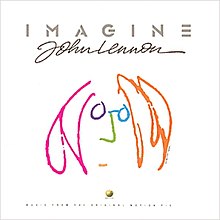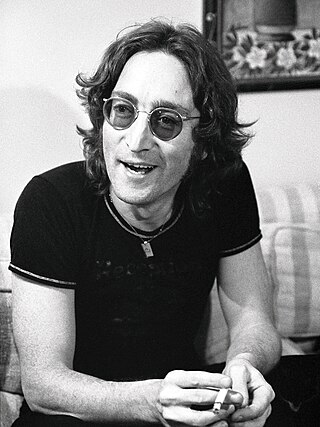
John Winston Ono Lennon was an English singer, songwriter and musician who gained worldwide fame as the founder, co-songwriter, co-lead vocalist and rhythm guitarist of the Beatles. His work included music, writing, drawings and film. His songwriting partnership with Paul McCartney remains the most successful in history.

Yoko Ono is a Japanese multimedia artist, singer, songwriter, and peace activist. Her work also encompasses performance art and filmmaking.

John Lennon/Plastic Ono Band is the debut solo studio album by English musician John Lennon. Backed by the Plastic Ono Band, it was released by Apple Records on 11 December 1970 in tandem with the similarly titled album by his wife, Yoko Ono. At the time of its issue, John Lennon/Plastic Ono Band received mixed reviews overall, but later came to be widely regarded as Lennon's best solo album.
Apple Records is a British record label founded by the Beatles in 1968 as a division of Apple Corps Ltd. It was initially intended as a creative outlet for the Beatles, both as a group and individually, plus a selection of other artists including Mary Hopkin, James Taylor, Badfinger and Billy Preston. In practice, the roster had become dominated by the mid-1970s with releases of the former Beatles as solo artists. Allen Klein managed the label from 1969 to 1973, then it was managed by Neil Aspinall on behalf of the Beatles and their heirs. Aspinall retired in 2007 and was replaced by Jeff Jones.
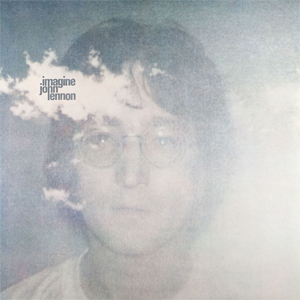
Imagine is the second solo studio album by British musician John Lennon, released on 9 September 1971 by Apple Records. Co-produced by Lennon, his wife Yoko Ono and Phil Spector, the album's elaborate sound contrasts the basic, small-group arrangements of his first album, John Lennon/Plastic Ono Band (1970), while the opening title track is widely considered to be his signature song.

Mind Games is the fourth solo studio album by English musician John Lennon. It was recorded at Record Plant Studios in New York in summer 1973. The album was released in the US on 29 October 1973 and in the UK on 16 November 1973. It was Lennon's first self-produced recording without help from Phil Spector. Like his previous album, the politically topical and somewhat abrasive Some Time in New York City, Mind Games received mixed reviews upon release. It reached number 13 in the UK and number 9 in the US, where it was certified gold.
"How Do You Sleep?" is a song by English rock musician John Lennon from his 1971 album Imagine.
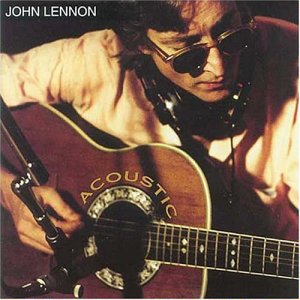
Acoustic is a compilation album of John Lennon demos, studio and live performances that feature his acoustic guitar work and was released in 2004. Although it failed to chart in the United Kingdom, Acoustic reached number 31 in the United States with sales of 27,858 copies, becoming John Lennon's best charting posthumous US release since 1988's Imagine: John Lennon soundtrack. It spent eight weeks on the chart.

John Lennon Anthology is a four-CD box set of home demos, studio outtakes and other previously unreleased material recorded by John Lennon over the course of his solo career from "Give Peace a Chance" in 1969 up until the 1980 sessions for Double Fantasy and Milk and Honey.

"Give Peace a Chance" is an anti-war song written by John Lennon, and recorded with the participation of a small group of friends in a performance with Yoko Ono in a hotel room in Montreal, Quebec, Canada. Released as a single in July 1969 by the Plastic Ono Band on Apple Records, it is the first solo single issued by Lennon, released while he was still a member of the Beatles, and became an anthem of the American anti-war movement during the 1970s. It peaked at number 14 on the Billboard Hot 100 and number 2 on the British singles chart.

The Plastic Ono Band was a rock band formed by John Lennon and Yoko Ono in 1969 for their collaborative and solo projects based on their 1968 Fluxus conceptual art project of the same name.

"Real Love" is a song written by the English musician John Lennon, formerly of the Beatles. He recorded six demos of the song in 1979 and 1980 with "Real Life", a different song that merged with "Real Love". In 1988, the sixth take was posthumously released for the documentary soundtrack Imagine: John Lennon. In 1995, his demo was completed by his former Beatles bandmates as part of the Beatles Anthology project, along with "Free as a Bird".

"The Ballad of John and Yoko" is a song by the English rock band the Beatles that was released as a non-album single in May 1969. It was written by John Lennon and credited to the Lennon–McCartney partnership, and chronicles the events surrounding the wedding of Lennon and Yoko Ono. The song was the Beatles' 17th UK number-one single and their last for 54 years until "Now and Then" in 2023. In the United States, it was banned by some radio stations due to the lyrics' reference to Christ and crucifixion. The single peaked at number 8 on the US Billboard Hot 100. The song has subsequently appeared on compilation albums such as Hey Jude, 1967–1970, Past Masters, and 1.

Fly is the second album by Yoko Ono, released in 1971. A double album, it was co-produced by Ono and John Lennon. It peaked at No. 199 on the US charts.

"Don't Let Me Down" is a song by the English rock band the Beatles, recorded in 1969 during the Let It Be sessions. It was written by John Lennon and credited to the Lennon–McCartney songwriting partnership. The band recorded the song with keyboardist Billy Preston; the single release with "Get Back" was credited to "the Beatles with Billy Preston". Originally released as a B-side, producer Phil Spector excluded the song from Let It Be. The song's first appearance on an album was on the 1970 collection Hey Jude.
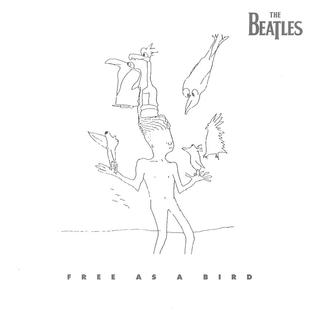
"Free as a Bird" is a single released in December 1995 by English rock band the Beatles. The song was originally written and recorded in 1977 as a home demo by John Lennon. In 1995, 25 years after their break-up and 15 years after Lennon's murder, his then surviving bandmates Paul McCartney, George Harrison and Ringo Starr released a studio version incorporating the demo.
"Grow Old with Me" is one of the final songs written by John Lennon. It was first recorded by Lennon as a demo while in Bermuda. A handwritten lyric sheet for the song is dated July 5, 1980 Fairyland Bermuda. The song was first released on the posthumous album Milk and Honey in 1984. It was also rumored to be among the songs planned as a possible reunion single by his former bandmates during the making of The Beatles Anthology.
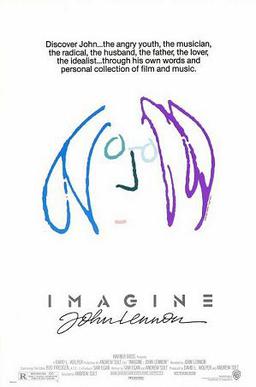
Imagine: John Lennon is a 1988 documentary film about English musician John Lennon. It was released on 7 October 1988, two days before Lennon's 48th birthday.

"Touch Me" is a song written by Yoko Ono that was first released on her 1970 album Yoko Ono/Plastic Ono Band. An edited version was later released in the U.S. as the b-side to John Lennon's single "Power to the People."
